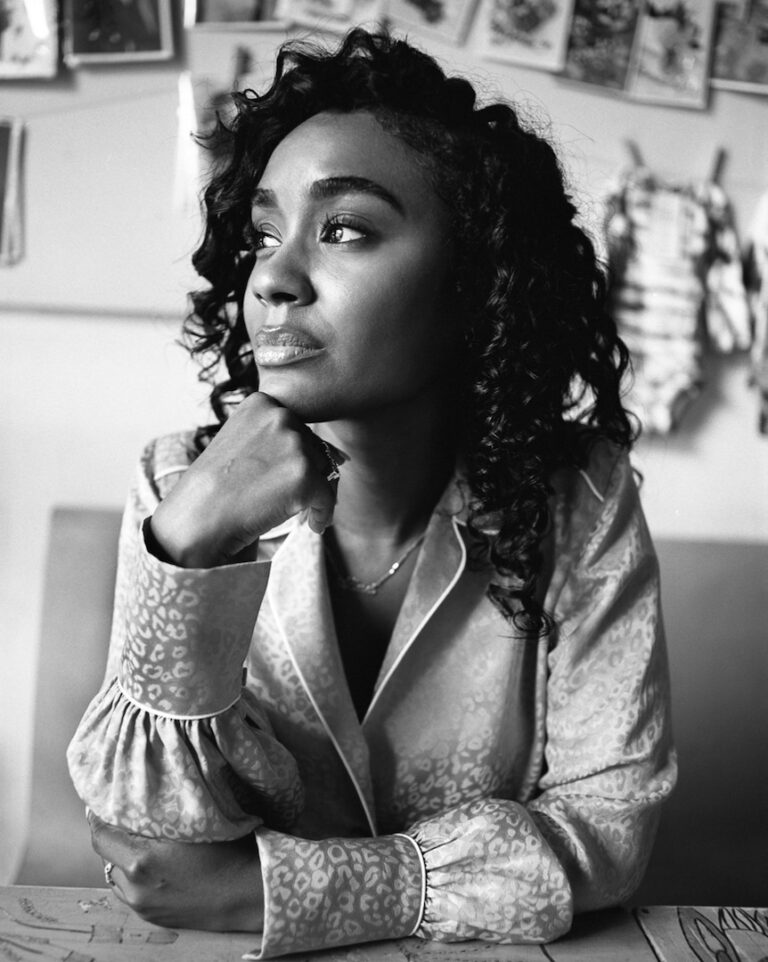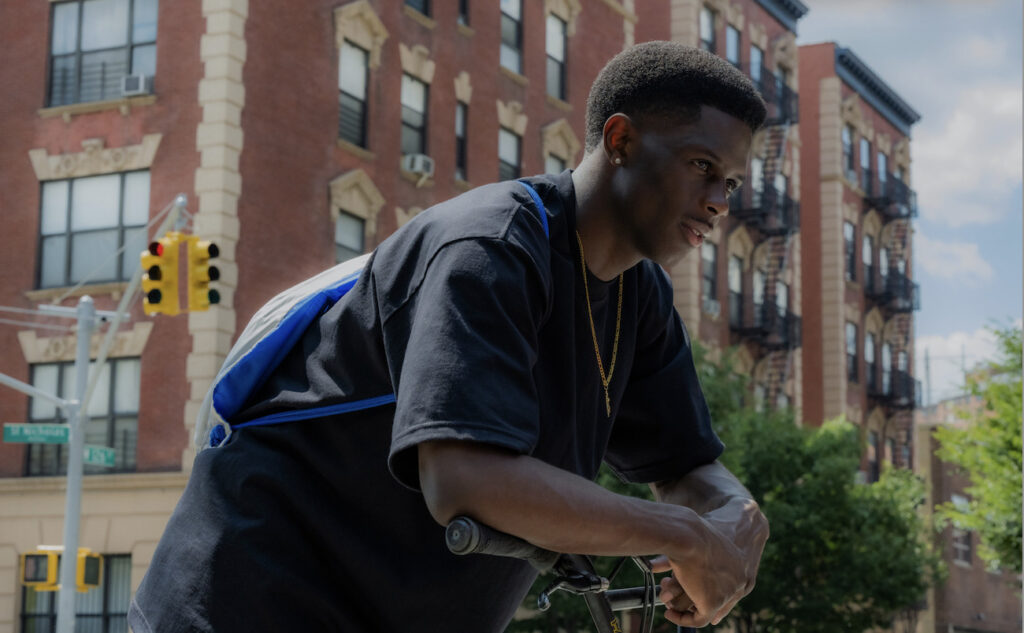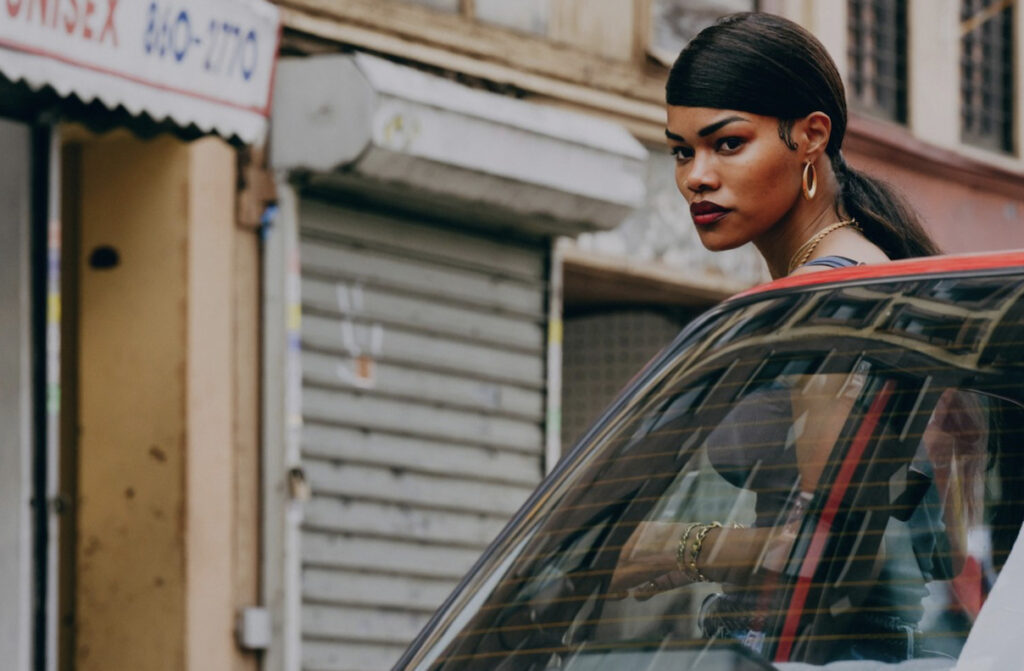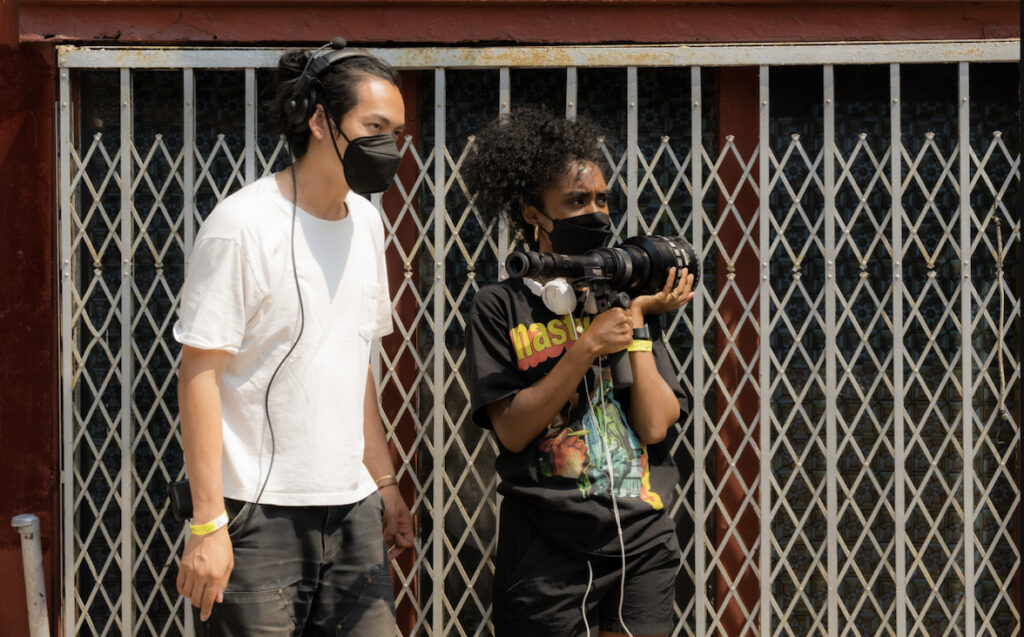
Synopsis : A THOUSAND AND ONE follows unapologetic and free-spirited Inez (Teyana Taylor), who kidnaps six-year-old Terry from the foster care system. Holding onto their secret and each other, mother and son set out to reclaim their sense of home, identity, and stability, in a rapidly changing New York City.

Exclusive Interview with Director A.V. Rockwell
Q: You wrote a wonderful script about a resilient woman. What was your experience in your life that resonated with you and made you decide to write this screenplay?
AVR: It was two major topics for me. First, it seemed the impact first-hand of the gentrification and how that was impacting the black neighborhoods of New York City. I felt like we were being erased and pushed out of the city altogether. For me, I love New York so deeply and it’s a part of who I am. To see that happening, it felt like how I feel about the kind of city that doesn’t love me. So that really drove me to want to tell the story.
Then, seeing generations of people that have fought for some level of stability in the city as well, to see everything that they fought for, in terms of our neighborhoods being able to thrive the way we have, [the gentrification] felt so unfair. For Harlem specifically to be such an important neighborhood not only to me but for black culture and history in general — it’s considered the mecca — to see that be lost [because of] gentrification and the policy that set the stage for gentrification felt like a devastating blow to black identity and heritage. So that was a big thing for me.
The other [topic] was wanting to honor the experiences of inner city black women, who are often misunderstood and made to feel invisible, not only in society but within our own communities. I really wanted to use Inez’s journey to explore that, as well as the question of, who is fighting for us? She spends the whole movie supporting everyone else, and you don’t really see as many people rooting and fighting for her. So I really wanted to use this as a way to honor and uplift these women and celebrate them. But also present this idea and this question about that, like who was really standing up for black women, and letting people see that we want to be equally loved and not just needed.
Q: Terry is played by three actors: Aaron Kingsley Adetola, Aven Courtney, and Josiah Cross. What kind of conversation did you have with them prior to shooting this film? Do you have any specific things to talk to those actors about, so you have the consistency of the characters?
AVR: Yeah, they were each building off of each other in terms of building the arc of who this young man is.
With Aaron, we worked on that part of himself that was who he was, first coming out of foster care and having things to reconcile in his relationship with Inez. But also, this is a kid who’s processing trauma, and he’s very uncomfortable in himself because he’s been very uncomfortable in the world. So you feel his withdrawn-ness and his self-ness because he’s very introverted. But you also see those little inklings of him that have a little bit of a feistiness. You see the parts of him that are very curious and very smart. I wanted to start there establishing not only who Terry was when we first find him as this damaged little boy, but somebody who starts to come out of his shell just a little bit, as he and Inez gain more stability.
Then Aven took it from there, and you see Terry in that awkward pre-teen stage, but much more extroverted than he was when we first met him, and vocal about what he’s feeling and thinking. And also figuring himself out. He may not have the whole language yet to figure out “Who am I?”, but he definitely seems further along. At the same time, we’re seeing the influence of his friends and Lucky, and obviously the rebellion he’s dealing with in his relationship with Inez. He’s still not quite who he wants to be yet.
I think 17-year-old Terry is the most actualized version of him, and Josiah would feel that maturity in how he portrayed Terry. You still feel the consistency of this kid who has acquired a spirit. But the way he moves through the world and the way he engages with everyone, you definitely feel he’s coming into the most holistic version of who he’s going to be as a man.

Q: Teyana Taylor’s performance throughout the film was very powerful. She’s also a mother in real life, but she’s been mainly a singer prior to this project. What elements made you cast her in the lead role?
AVR: She had so many of the qualities that I was looking for, in terms of her being able to balance not only the pedigree of an actress who could really tackle a very complicated character, but also a truthfulness. I felt she represented Inez in a way that like, yeah, you believe she was a New York City girl, and you believe that she was this raw woman who came from the streets. Teyana was able to connect to that in a way that really showed a level of understanding and empathy with this character, really having compassion for her, being with her, versus looking down at her.
So many of the actors that I do admire in the business and would love to work with — I wasn’t really sure that I would get that. I felt it might come up more performative if they didn’t have an experience that either they could pull from, whether they knew this woman in real life, or they’d been a version of her in real life. I needed everyone to read for this role, I needed to see it in the room.
Teyana being a part of that process, I could tell even when she only had a few pages that she really, really understood this character through and through, and the fact that she could also see the colors of Inez, not just the movie character. Beyond her being this Harlem girl, Inez has so many rich layers to her and you can see access to all of those pieces of her in Teyana’s performance. The last part of that is that she was able to juxtapose this very tough woman with that sense of vulnerability and that nurturing quality. I think her being a mother in real life really shines through in her portrayal.
Q: The film shows how conscious you are about that reflection of Harlem in the Nineties and early 2000s, with gentrification, stop-and-frisk policing and things like that. What was the challenge of shooting in New York incorporating all of those elements?
AVR: The hardest thing about shooting New York is that it is a city that continues to change dramatically. Covid definitely set that from zero to sixty. The way that the city was continuing to change on us in addition to how challenging it was, I had a lot of strong ideas of the strategy we could take to visually capture the city, to really honor this period.
There were so many restrictions, with permittings, and we were just coming out of the lockdowns. We shot this when people were just starting to get back to productions and it was still very limited. So having limited access to the city, and then tying into that, you’re doing a period piece, it’s much more tricky trying to blend in the real world and what’s happening. And then you have a whole bunch of Covid masks on top of that, so it was really challenging. And obviously Covid itself, the way that put a dent into our budget, and that made it dramatically that much more difficult to try to capture New York.
So we really had to adapt it, be really smart about how we handled it, and between the collaboration between myself and my DP, Eric Yue, production designer, Sharon Lomofsky, and my costume designer, Melissa Vargas, what we were able to craft within that space was really wonderful. And then even in post — the sound design, the way that brings you immersively into New York, as well as visual effects, there’s other things that we pulled in to really bring it all together.

Q: Do you think for the people in Harlem, their vision of the American dream has changed from the mid-90s to the early 2000’s?
AVR: I don’t think their vision of the American dream has changed. They still want that as much as anybody who lives in this country wants that. It’s the reality that every time we get to a place as a black community where we start to feel “Okay, we have overcome this obstacle” [there’s another one].
In the case of Harlem specifically, Harlem spent generations trying to overcome everything that was thrown at our community. Beginning with the early Nineties, they had just come out of the drug epidemic which had a really huge impact on black neighborhoods like Harlem. So to spend that period in the Nineties and the early 2000s getting back on our feet and being able to have a community that’s starting to thrive again, gentrification is just another thing that comes in as an obstacle for our community to overcome. It makes it that much more difficult to not only access the American dream, but hold on to it once you do get a grip.
Q: This film won the top prize at the Sundance Film Festival. What was your reaction to that? How did the film resonate with the audience while you were there?
AVR: Yeah, it’s incredible. I’m so tremendously grateful to Sundance for being so supportive overall, and I think in this case the jury — it meant so much to me hearing the words they had to say as they shared not only that they selected my film, but why. Jeremy O. Harris, who spoke on behalf of all the jury members, gave such an impassioned speech, and to me, I wasn’t seeing somebody who was judging a film from the perspective of somebody in the industry or a cinephile. It was just like a human being who had a connection in the audience of a story that he was witnessing. So hearing what he had to say and how personally the movie resonated with him as well as his fellow jury members, that definitely stood out to me, and to me that is what gave value to receiving that award.
It’s knowing that this movie that I did, that I made with the people in mind and made with the intention to really reach and connect with people — either helping them see themselves, but also helping give them an opportunity to see other human beings that they live amongst a lot better, too. Seeing the success of that through how the movie was able to resonate with them in a special way definitely felt very beautiful and showed me the success of what we accomplished.
Q: Thank you so much.

Check out more of Nobuhiro’s articles.
Here’s the trailer of the film.

